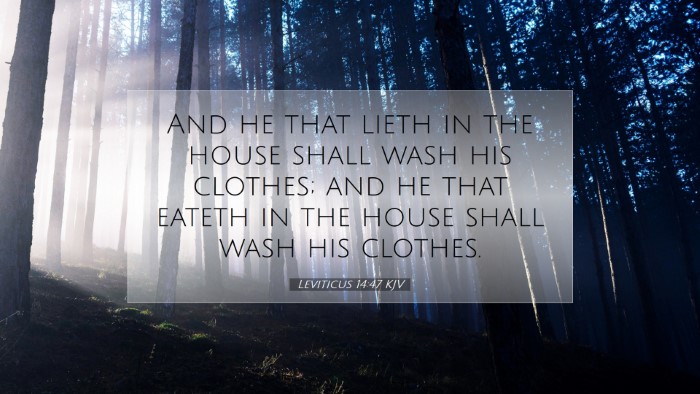Commentary on Leviticus 14:47
Verse: Leviticus 14:47 - "And he that lieth in the house shall wash his clothes; and he that eateth in the house shall wash his clothes."
Introduction
The theme in Leviticus 14 revolves around purification and the restoration of cleanliness following the affliction of leprosy. This chapter provides detailed instructions on the sacrifices and rituals necessary for a person to be declared clean. Verses like 14:47 emphasize the importance of cleanness in both physical and spiritual terms. This commentary synthesizes insights from several public domain sources to create a comprehensive understanding of this verse.
Exegesis of Leviticus 14:47
Leviticus 14:47 highlights the significance of cleanliness within the house, which can be seen as a metaphor for the community of believers. It emphasizes that anyone who has been in a contaminated space (the house afflicted with leprosy) has a responsibility to cleanse themselves. This serves both literal and symbolic meanings.
1. Historical Context
The laws in Leviticus are situated within the larger framework of Israelite identity and holiness. The stipulations regarding leprosy were given to ensure that the community remained pure and that God’s holiness was maintained. The house affected by 'leprosy' represents a space that has been tainted with sin or sickness, necessitating ritual action to restore purity.
2. Spiritual Significance
Matthew Henry, in his commentary, stresses the importance of understanding Leviticus as a foreshadowing of New Testament teachings on sin and redemption. Just as one must cleanse themselves from the contamination of leprosy, believers today must be vigilant against the spiritual contamination that sin brings into their lives.
3. Personal Responsibility
Albert Barnes notes that this verse places a clear duty on individuals regarding their participation in purification rituals. The washing of clothes symbolizes a tangible response to the inner spiritual state. This indicates that one’s actions are a reflection of their spiritual health. The act of washing can be seen as an external sign of internal repentance.
4. Community Implications
Furthermore, Adam Clarke comments on the communal aspects of purification. The phrase, "he that eateth in the house shall wash his clothes," implies fellowship and shared experience, highlighting the call for community awareness regarding sin and impurity. It reinforces the idea that personal cleanliness contributes to communal holiness, reflecting the interconnectedness of the body of Christ.
Applications for Today
This verse invites believers to consider the impact of their surroundings and associations. Here are several applications:
- Self-Examination: Just as one must cleanse themselves from the leprosy of sin, Christians today should engage in regular self-examination to identify areas of spiritual uncleanness.
- Responsibility to Others: Believers should recognize that their actions affect not only themselves but also their community. Taking responsibility for one's spiritual health promotes a culture of holiness.
- Community Holiness: The church, as the body of Christ, should work together to maintain purity among its members, fostering an environment conducive to spiritual growth.
- Symbol of Purification: The washing of clothes serves as a literal reminder of the inward transformation that comes through faith in Christ, who purifies us from all sin.
Conclusion
Leviticus 14:47 emphasizes the necessity of both personal and communal responsibility in terms of spiritual purity and hygiene. As students, pastors, theologians, and scholars reflect on this passage, they are reminded that God calls His people to a standard of holiness that influences every aspect of their lives. Just as washing clothes is an act of cleansing from physical impurity, so too must believers regularly engage in the act of spiritual cleansing through confession, repentance, and active participation in the life of the community of faith.


